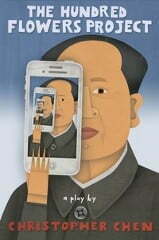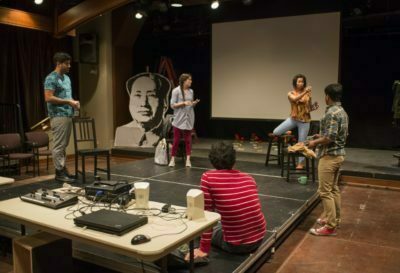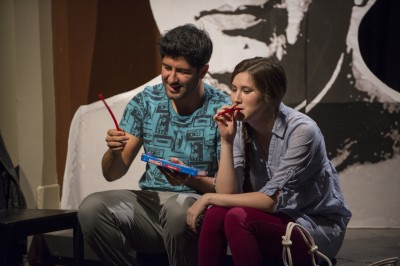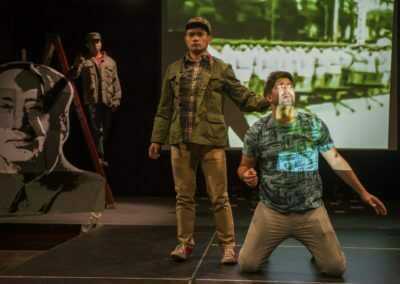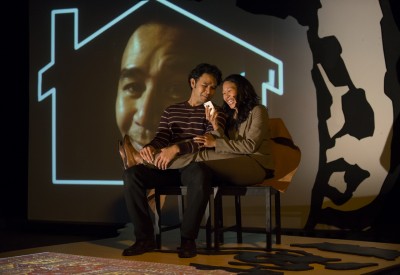The Hundred Flowers Project
Directed by Joanie Schultz
Produced by Silk Road Rising
Convoluted Intersection of Mao, Beckett, Boal, TwitPic
Silk Road Rising’s latest production is the deeply philosophical The Hundred Flowers Project, a 2012 play that explores just about every issue you’re likely to stray across in a survey of graduate level performing arts classes. The company bills it as experimental and avant-garde, and they aren’t kidding.
Our story begins with a group of actors gathered in a rehearsal space to devise a show about Mao Tse-Tung’s reign and contemporary use of social media in the United States. It is quickly apparent that this is a rather poorly managed session, with the collaborators cutting each other off so frequently nobody can finish a single sentence. They also haven’t resolved some key questions, like how much knowledge of modern Chinese history should an American audience be expected to have, and how is social media related to the Cultural Revolution, exactly? It also speaks volumes of their knowledge that they struggle to think of a link between Maoist propaganda and theatre.
Soon, personalities are clashing, and people are saving their actual opinions for whispered discussion during breaks. Aidan (Joseph Sultani), who plays Liu Shaoqi, believes that group leader Mel (Mia Park) is only pretending to invite other opinions to diffuse responsibility for their train wreck of a show. Just like in the real Hundred Flowers campaign, get it? Mel is loyally served by Sam (Kroydell Galima) in devising tech along with the script, but tension is simmering among the cast over Mike (Karmann Bajuyo), who plays Mao, and his non-actor wife Julie (Melissa Canciller). Mike broke up with company member Lily (Hannah Toriumi) to rapidly date and marry Julie, then made out with Lily again, and has now brought Julie to rehearsal as a weird form of therapy. Julie suggests inserting a journalist character into the play, which is obviously totally contrary to the non-narrative structure favored by democratically-minded devised and applied theatre groups because of its inherent hegemonic privileging of one individual’s story over the natural unity and spontaneity of the group. So while all input is welcome, Julie should just shut up.
If this play were only a satire of Augusto Boal-type socially conscious theatre contextualized within Chinese history, it would be inside baseball enough. But the second act takes us into outright absurdism, as the theatre technology seizes direct control of the human characters and forces them through seemingly spontaneous fourth-wall breaking story snippets, which are of course, really scripted. We learn that in the past five years, Hundred Flowers Campaign the show-within-the-show eventually became so interactive it lost its roots in Chinese history and became all about audiences observing past audiences, and recording themselves to be seen by future audiences. The stage lights also have it in for Julie and keep bombarding her with amnesia-inducing flashes, forcing her to re-envision her romantic life in an effort to root out narrativism. From the light booth, Mel recites poetry about how both the transient space of the stage and the Cultural Revolution create an eternal present without any past, in which every statement is taken to be true and is subject to change.
At the risk of sounding provincial, I was impressed that Michael Stanfill’s video and projections all functioned on cue. The endlessly repeating chain of screens and cameras made a fascinating spectacle, aided by Sarah K. Hughey’s lighting and Peter J. Storms’s sound design. Director Joanie Schultz and technical director Jason Pikscher deserve a lot of credit for getting all these elements moving together in a semi-coherent way. The technology certainly becomes its own character. Since they are explicitly meat-puppets, the actors seize every opportunity for emotional interaction they’re allowed. Bajuyo and Canciller even sell a romance that’s supposed to seem manufactured.
I think the ideal audience for this play would be philosophy undergrads. The play contains a lot of ideas about how social media seems to be a vehicle for organic expressions but actually result from manipulation, as in the Facebook mood experiment, or allows people to perpetually revise their persona, as with Snapchat. And I suppose the sort of mindless howling that gets hash-tags like cancel Colbert trending for a week could be dangerous once we start getting more politicians who know how to turn on their computers.
But the connection between authoritarians masquerading as liberators and ontology is forced, and the number of people who enjoy watching a devised theatre group implode is about equal to the number of people who enjoy ontological discourse. The dramaturge’s note in the program focuses entirely on Chinese history, which is arguably the least important element in the show audiences are unlikely to be familiar with. Only theatre majors are likely to have had exposure to the sort of devising process Mel uses, and the dialogue in Act I is so choppy, other people won’t be able to figure out what’s going on. Also, one of the main fears people have about the internet is the inability to erase old content, which is the opposite of the show’s concern about rewriting the past. I’m still not convinced social media really allows people to manipulate others’ perception of them to a greater degree than people always have. The Hundred Flowers Project demands its audience come with such a strong knowledge of so many different fields, I don’t think those who do will get anything new out of it, and those who don’t will be lost.
Somewhat Recommended
Jacob Davis
Reviewed October 25, 2014
For more information, see The Hundred Flowers Project’s page at Theatre in Chicago.
Playing at Pierce Hall in The Historic Temple Building, 77 West Washington Street, lower level. To order, call 312-857-1234 x 201 or visit www.silkroadrising.org. Runs October 16-November 23, Thursdays at 7:30 pm, Fridays and Saturdays at 8:00 pm, Sundays at 4:00 pm. Tickets are $35 for adults, $17.50 for students. Running time is 110 minutes with one intermission.

